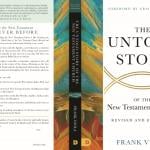Did Adam have to earn access to the tree of life? Not at all. Nothing could be clearer in Genesis 2: God offers every tree of the garden, and makes one – count ‘em – one exception, the tree of the knowledge of good and evil. The tree of life was there for the taking. Adam had only to accept God’s offer, take, and eat. After the fall, God kept Adam from the tree of life, until Life itself appeared... Read more




















